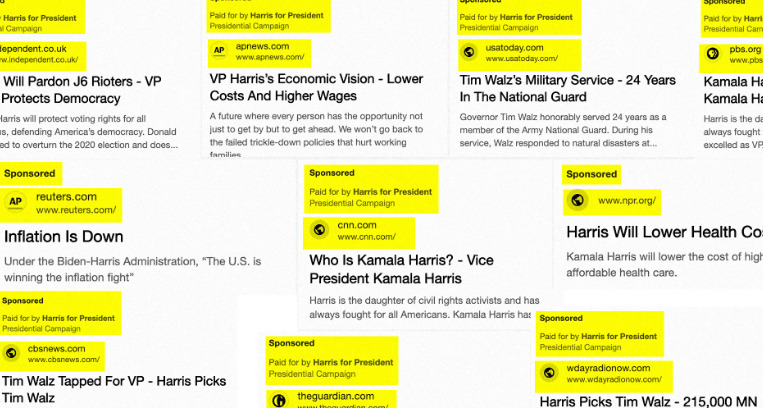
Peter Zeihan: Why Do the Democrats Keep Losing Ground?
The future of the Democratic Party in the US isn’t looking too bright. When strategy and targeting don’t change for over half a century, I…
Thought Leader: Peter Zeihan

This piece is by WWSG exclusive thought leader, Sara Fischer.
The Harris campaign has been editing news headlines and descriptions within Google search ads that make it appear as if the Guardian, Reuters, CBS News and other major publishers are on her side, Axios has found.
Why it matters: It’s a common practice in the commercial advertising world that doesn’t violate Google’s policies, but the ads mimic real news results from Search closely enough that they have news outlets caught off guard.
What they’re saying: “While we understand why an organization might wish to align itself with the Guardian’s trusted brand, we need to ensure it is being used appropriately and with our permission. We’ll be reaching out to Google for more information about this practice,” a Guardian spokesperson said.
Reality check: Google said the ads don’t violate its rules, but platforms have in the past wrestled with whether this type of format can spread misinformation.
Between the lines: A source familiar with the Harris campaign’s ads team said the campaign buys search ads with news links to give voters searching for information about Vice President Harris more context.
Zoom in: Since Aug. 3, nearly a dozen news companies have been used in these types of search ads from the Harris campaign, Axios found.
The big picture: The political ad world has always been murky, but a lack of regulation in the digital world has put the onus on tech firms to decide what’s deceptive and what’s fair.
The intrigue: The mainstream media industry is already fighting assertions of bias. These ads, even though they comply with Google’s rules, could leave media outlets further vulnerable to charges of partisanship.
Peter Zeihan: Why Do the Democrats Keep Losing Ground?
The future of the Democratic Party in the US isn’t looking too bright. When strategy and targeting don’t change for over half a century, I…
Thought Leader: Peter Zeihan
Peter Goodman: His Start-Up May Not Survive Trump’s Tariffs
A sourdough baker turned entrepreneur in North Carolina has delayed his new product as he contemplates the prospect that higher costs will doom his company.…
Thought Leader: Peter Goodman
Patrick McGee: Is Tim Cook the Right or Risky Choice for Apple?
Deepwater’s Gene Munster and author of ‘Apple in China’ Patrick McGee, join ‘The Exchange’ to discuss whether Apple needs a new CEO and what needs…
Thought Leader: Patrick McGee

